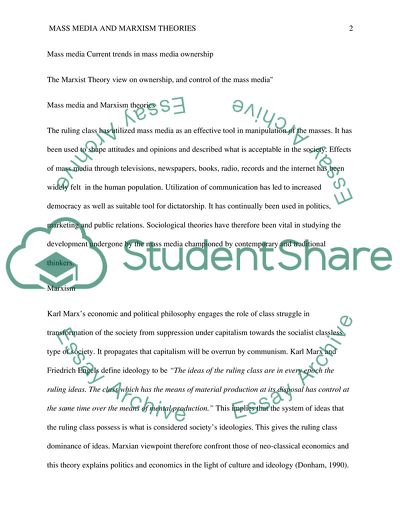Cite this document
(The Marxist Theory View on Ownership Essay Example | Topics and Well Written Essays - 1250 words, n.d.)
The Marxist Theory View on Ownership Essay Example | Topics and Well Written Essays - 1250 words. https://studentshare.org/media/1821429-mass-media-current-trends-in-mass-media-ownership-confirm-the-marxist-theory-view-on-ownership-and-control-of-the-mass-media
The Marxist Theory View on Ownership Essay Example | Topics and Well Written Essays - 1250 words. https://studentshare.org/media/1821429-mass-media-current-trends-in-mass-media-ownership-confirm-the-marxist-theory-view-on-ownership-and-control-of-the-mass-media
(The Marxist Theory View on Ownership Essay Example | Topics and Well Written Essays - 1250 Words)
The Marxist Theory View on Ownership Essay Example | Topics and Well Written Essays - 1250 Words. https://studentshare.org/media/1821429-mass-media-current-trends-in-mass-media-ownership-confirm-the-marxist-theory-view-on-ownership-and-control-of-the-mass-media.
The Marxist Theory View on Ownership Essay Example | Topics and Well Written Essays - 1250 Words. https://studentshare.org/media/1821429-mass-media-current-trends-in-mass-media-ownership-confirm-the-marxist-theory-view-on-ownership-and-control-of-the-mass-media.
“The Marxist Theory View on Ownership Essay Example | Topics and Well Written Essays - 1250 Words”. https://studentshare.org/media/1821429-mass-media-current-trends-in-mass-media-ownership-confirm-the-marxist-theory-view-on-ownership-and-control-of-the-mass-media.


